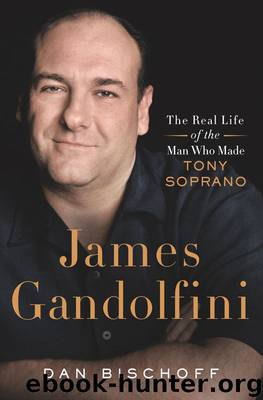James Gandolfini: The Real Life of the Man Who Made Tony Soprano by Bischoff Dan

Author:Bischoff, Dan [Bischoff, Dan]
Language: eng
Format: epub
Publisher: St. Martin's Press
Published: 2014-04-08T00:00:00+00:00
7.
Troubles on the Set (2000–2003)
Five years after The Sopranos ended, scriptwriter Terence Winter, who went on to create the cable series Boardwalk Empire about the Jazz Age gangsters who built the Jersey Shore, told Vanity Fair that there was a sort of barbershop-mirrors effect to writing about the Mafia.
“One F.B.I. agent told us early on that on Monday morning they would get to the F.B.I. office and all the agents would talk about The Sopranos,” Winter recalled. “Then they would listen to the wiretaps from that weekend, and it was all mob guys talking about The Sopranos, having the same conversation about the show, but always from the flip side. We would hear back that real wiseguys used to think that we had somebody on the inside. They couldn’t believe how accurate the show was.”
Forget about what the F.B.I. thought of The Sopranos. The real point here is that the mob thought it was so true that Chase or someone at HBO had to have an inside source—they thought there was a stool pigeon singing in David Chase’s ear.
One of the great things about The Sopranos was the way it played with fact and fiction. The Sopranos had embedded in it an ongoing critique, or maybe parody, of the way reality is depicted by TV. David Chase took delight in mocking the established conventions of dramatic closure and edifying moral lesson that TV had always peddled. His show pretended to realism while depicting a perennial fictional American archetype, the Italian mobster; it became a hit dramatic series, based on wonderfully written scripts, in an era when “reality TV” and (at least putatively) unscripted stories were the hottest innovations in the medium. Untying the knots Chase’s series wove between his world and our own became one of the delights fans found so fascinating about Tony Soprano’s story.
Chase himself had described the show as The Simpsons with guns or Twin Peaks in the Meadowlands. He was thinking of the vulgarity of The Simpsons, its anarchic parody of the ups and downs of family life as it is usually shown on TV. The Sopranos would be a parody of Italian gangster movies, of the sentimental mythic sheen The Godfather movies peddled, and of day-to-day suburban life. We’d see Tony Soprano drive to the mall, buy an ax at a gardening center, play golf with his next door neighbor.
Gandolfini said that he’d heard Chase say the show was a story about “people lying to themselves” about who they are.
Gandolfini’s performance carried the greatest truth. He seemed to braid reality and art effortlessly. He was, of course, a Jersey guy—even though he needed an accent coach to get that clipped, central Jersey, staccato-Italianese sound. He was gregarious, but he could be moody; he was gently clumsy, sweet, and intuitive about the feelings of others, but he could be forceful when pushed or cornered, like you might expect of a former nightclub bouncer. On the show, when Tony is spotted at the gardening center carrying the ax, his neighbor visibly quakes with fear at the sight.
Download
This site does not store any files on its server. We only index and link to content provided by other sites. Please contact the content providers to delete copyright contents if any and email us, we'll remove relevant links or contents immediately.
| Actors & Entertainers | Artists, Architects & Photographers |
| Authors | Composers & Musicians |
| Dancers | Movie Directors |
| Television Performers | Theatre |
Cecilia; Or, Memoirs of an Heiress — Volume 2 by Fanny Burney(31947)
Cecilia; Or, Memoirs of an Heiress — Volume 3 by Fanny Burney(31932)
Fanny Burney by Claire Harman(26597)
We're Going to Need More Wine by Gabrielle Union(19034)
Plagued by Fire by Paul Hendrickson(17405)
All the Missing Girls by Megan Miranda(15959)
Cat's cradle by Kurt Vonnegut(15338)
Bombshells: Glamour Girls of a Lifetime by Sullivan Steve(14058)
For the Love of Europe by Rick Steves(13915)
Leonardo da Vinci by Walter Isaacson(13318)
4 3 2 1: A Novel by Paul Auster(12375)
The remains of the day by Kazuo Ishiguro(8978)
Adultolescence by Gabbie Hanna(8922)
Note to Self by Connor Franta(7663)
Diary of a Player by Brad Paisley(7564)
Giovanni's Room by James Baldwin(7330)
What Does This Button Do? by Bruce Dickinson(6195)
Ego Is the Enemy by Ryan Holiday(5415)
Born a Crime by Trevor Noah(5376)
